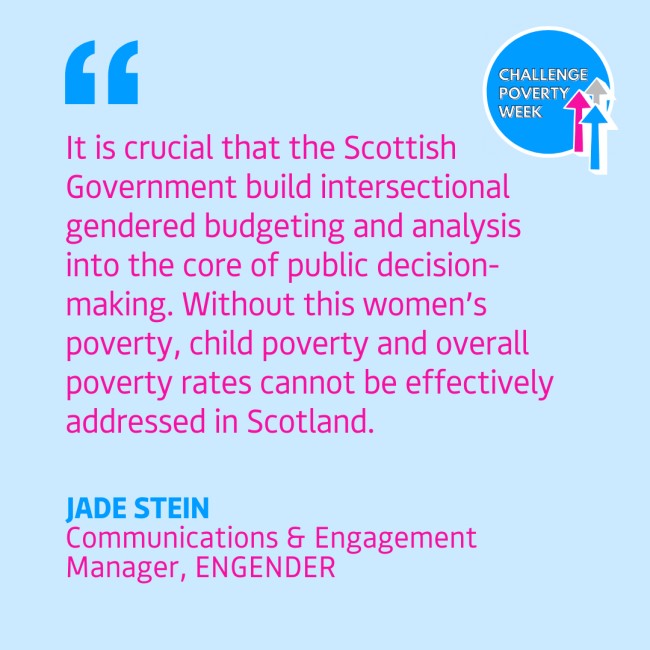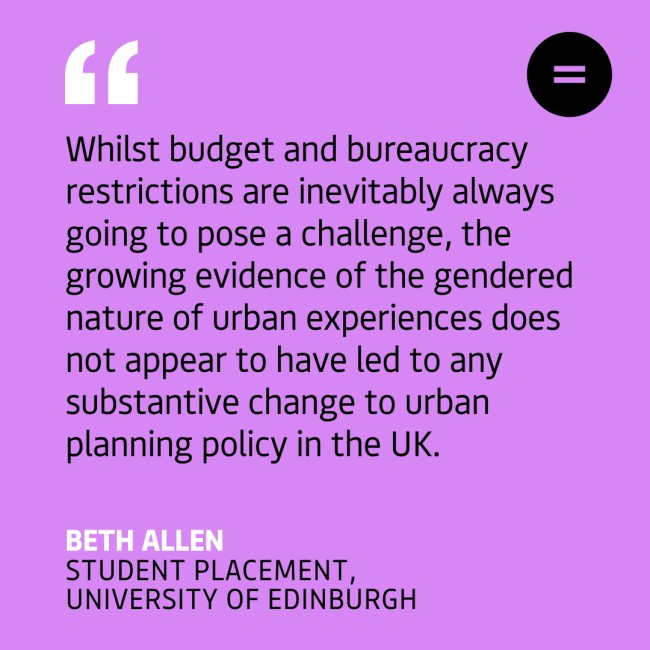Engender blog
All of Engender’s latest news. Reports, reviews, books, articles, and information from across Scotland’s women’s sector.
We would love to hear from other feminists around Scotland. Check out our guidelines for more information on how you can blog for us.
The largest poverty indicator that no one's talking about
This week (2-7th October) marks Challenge Poverty Week, an annual campaign highlighting the injustice of poverty in Scotland, and to show that collective action based on justice and compassion can create solutions.
We know that women’s poverty is a result of long-standing, deep-rooted, and systemic fault lines in our society. In this blog, our Communications and Engagement Manager Jade Stein explores the need to make visible how poverty & economic inequality are experienced at higher rates by women & marginalised groups across our society.

Around one-fifth of Scotland’s people – more than a million of us – live in poverty. For a rich nation, with an abundance of resources, this is simply outrageous. 
New report reveals devastating impact of Covid-19 on access to pregnancy and maternity services
Engender and the Health and Social Care Alliance Scotland (the ALLIANCE) have today published a new report spotlighting women’s experiences of pregnancy and maternity services during the Covid-19 pandemic.
The report, ‘“Trauma, abandonment and isolation”: Experiences of pregnancy and maternity services in Scotland during Covid-19’, draws on survey responses from over 200 women across Scotland. It documents the profound and negative impact that public health restrictions had on access to vital healthcare across all aspects of these services from antenatal care, fertility treatment, to miscarriage and baby loss, birth and the postnatal period.
Key findings include:
- Confusing, contradictory and limited communication about Covid-19 mitigation measures caused extreme anxiety and distress for pregnant women.
- The shift away from in-person care to remote appointments was a barrier to adequate standards of care.
- Isolation as a result of restrictions negatively affected all aspects of pregnancy and maternity care. Women underwent invasive procedures, gave birth, and suffered miscarriage and baby loss without support, suffering trauma as a result.
- Inflexible and inconsistent application of guidelines across different health board areas and health settings led to uncertainty and perceptions of unfairness.
- A narrow focus on labour and delivery meant wider health needs were overlooked, including mental health and breastfeeding support.
- Gendered health inequalities, such as pain management and the lack of an intersectional approach, were exacerbated by the pandemic.
- Ongoing impacts include gaps in mental health support and experiences of trauma relating to isolation and poor care.
Jill Wood, Policy Manager at Engender, said:
“This research indicates that Covid-19 guidance and its application fundamentally failed to take account of women’s diverse needs and experiences during pregnancy and early motherhood. Confusing and contradictory communication, lack of in-person care and support, inflexible restrictions and inconsistent approaches across health board areas all undermined access to safe, dignified and quality healthcare.”
“The trauma caused by attending procedures and giving birth alone and the subsequent isolation, lack of support and adequate care, will stay with women long into the future."
"Scottish Government must learn from this, improve maternal health more broadly, and deliver on commitments on women’s health.”
Jane Miller, Academy Programme Manager at the ALLIANCE, said:
“Pregnancy and early parenthood can be challenging at the best of times. Our research shows that mitigation measures brought in during the pandemic exacerbated isolation and anxiety for many women in Scotland.”
“There is now an urgent need to centre the experiences and priorities of women in the ongoing Covid-19 Inquiry, and in the development of any future emergency guidance regarding healthcare. We must mitigate the risk of isolation and adopt flexible, person-centred approaches grounded in human rights and gender equality.”
A research participant said:
“It is essential that Scotland learns from people's experiences during the pandemic to improve maternity services and public health messaging. To do otherwise would be to fail, and further compound the trauma, of thousands of parents over the last few years.”
The report concludes with a series of recommendations aimed at the Scottish Covid-19 Inquiry and decision-makers in Scottish Government and health bodies. It highlights the need for a gendered and human rights approach to crisis management regarding healthcare, and for policy and services to take account of women’s particular experiences and needs at all life stages.
The report will be submitted as evidence to the Scottish Covid-19 Inquiry.
Read the report online here.
GUEST POST: Critically minded? The problem of diversity in film criticism
Engender and the Equal Media and Culture Centre for Scotland have hosted student placements from the MSc in Social Research at the University of Edinburgh and the University of Strathclyde Applied Gender Studies and Research Methods course. As part of their research outputs, the students have produced a series of blogs.
In this post, Alex highlights the need for an intersectional approach to examining our cultural data and why we need more diverse voices in film criticism.

Film criticism fulfils multiple purposes. People read film reviews for suggestions on what to watch, and whether it’s worth shelling out to go to the cinema.
As a result, film reviews are also tied to a film’s financial success, its consideration for awards and whether it gets a wide release at all. Thus, critics can become “gatekeepers,” defining what counts as “good” art.
GUEST POST: Feminist urbanism: Creating gender-equal cities in Scotland
Engender and the Equal Media and Culture Centre for Scotland have hosted student placements from the MSc in Social Research at the University of Edinburgh and the University of Strathclyde Applied Gender Studies and Research Methods course. As part of their research outputs, the students have produced a series of blogs.
In this post, Beth looks at how women and men experience public space and urban environments and how we can create gender-equal cities in Scotland.

When considering issues of gender inequality, one aspect that is perhaps far subtler and more discrete than others is the way in which the built environment is experienced differently by men and women.
In recent decades, feminist research has studied this phenomenon, with the evidence undeniably pointing to women being disadvantaged in their use of urban spaces. From a lack of accessible and functional public toilets, which biologically women require greater use of, to transport systems that are not built for a purpose beyond that of a daily office commuter, a range of factors have been demonstrated to restrict women’s access to the cities.
GUEST POST: Digital abuse against feminist scholars: a case study
Engender and the Equal Media and Culture Centre for Scotland have hosted student placements from the MSc in Social Research at the University of Edinburgh and the University of Strathclyde Applied Gender Studies and Research Methods course. As part of their research outputs, the students have produced a series of blogs.
In this post, Yoke explores a case study of the online backlash and digital abuse experienced by feminist researchers and scholars.
![The graphic shows a light blue background with white left-aligned text quote that reads "Research has shown that when women speak publicly about ‘controversial’ topics, such as feminism, this triggers online abuse. [...] These attacks must be recognised as part of a historical pattern of violent repercussions against those who defy patriarchal, white supremacist, capitalist dominance.". The quote is attributed to Yoke Baeyens, Student Placement, University of Strathclyde. In the top right-hand corner of the graphic there is the Equal Media and Culture Centre logo.](/siteimages/Blog/yoke-blog-2.png)
Online abuse is used as a silencing mechanism against women and other minoritised identities in the public (online) space.
Weaponising misogyny and dehumanisation techniques, perpetrators aim to push their targets outside the public sphere, to reinstate misogynistic, heteronormative dominance. These public displays of violence also serve to remind and threaten others who might want to defy misogynist, white supremacist, and heteronormative power structures. As Gosse et al. (2021) state, online abuse causes scholars and journalists to self-censor and choose ‘safe’ topics to discuss publicly in an attempt to protect themselves, thereby upholding the status quo. Indeed, research has shown that when women speak publicly about ‘controversial’ topics, such as feminism, this triggers online abuse. This is particularly a problem for feminist scholars who use social media to spread information on feminist research. These attacks must be recognised as part of a historical pattern of violent repercussions against those who defy patriarchal, white supremacist, capitalist dominance. Women have always been the target of abuse, and while the medium is new and everchanging, the intention is not.
Downloads
 Engender Briefing: Pension Credit Entitlement Changes
From 15 May 2019, new changes will be introduced which will require couples where one partner has reached state pension age and one has not (‘mixed age couples’) to claim universal credit (UC) instead of Pension Credit.
Engender Briefing: Pension Credit Entitlement Changes
From 15 May 2019, new changes will be introduced which will require couples where one partner has reached state pension age and one has not (‘mixed age couples’) to claim universal credit (UC) instead of Pension Credit.
 Engender Parliamentary Briefing: Condemnation of Misogyny, Racism, Harassment and Sexism
Engender welcomes this Scottish Parliament Debate on Condemnation of Misogyny, Racism, Harassment and Sexism and the opportunity to raise awareness of the ways in which women in Scotland’s inequality contributes to gender-based violence.
Engender Parliamentary Briefing: Condemnation of Misogyny, Racism, Harassment and Sexism
Engender welcomes this Scottish Parliament Debate on Condemnation of Misogyny, Racism, Harassment and Sexism and the opportunity to raise awareness of the ways in which women in Scotland’s inequality contributes to gender-based violence.
 Gender Matters in Social Security: Individual Payments of Universal Credit
A paper calling on the Scottish Government to automatically split payments of Universal Credit between couples, once this power is devolved to the Scottish Parliament.
Gender Matters in Social Security: Individual Payments of Universal Credit
A paper calling on the Scottish Government to automatically split payments of Universal Credit between couples, once this power is devolved to the Scottish Parliament.
 Gender Matters Manifesto: Twenty for 2016
This manifesto sets out measures that, with political will, can be taken over the next parliamentary term in pursuit of these goals.
Gender Matters Manifesto: Twenty for 2016
This manifesto sets out measures that, with political will, can be taken over the next parliamentary term in pursuit of these goals.
 Scottish NGO Briefing for UN Special Rapporteur on Violence Against Women
Joint briefing paper for the UN Rapporteur on Violence Against Women.
Scottish NGO Briefing for UN Special Rapporteur on Violence Against Women
Joint briefing paper for the UN Rapporteur on Violence Against Women.

Newsletter
Sign up to receive our newsletter here:
Sign up to our mailing list
Receive key feminist updates direct to your inbox: